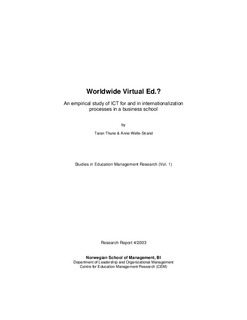| dc.description.abstract | This report addresses the issues of internationalization and how information and communication technologies are parts of internationalization processes in higher education. It is frequently assumed that Information and Communication Technologies (ICTs) are pivotal in globalization of higher education and in internationalization processes, by posing opportunities for integration across time and space enabling distributed nodes to work as units in real time. Moreover, it is claimed that globalization and new technologies has lead to a global market for education, in which new providers of higher education operate, and that this competitive agenda poses significant threats to traditional providers. This report investigates these assumptions through a case study.
To provide some background and focus for the empirical work central concepts are discussed related to globalization and higher education, international competition and cooperation, and the role of Information and Communication Technologies in internationalization related to potentials for overcoming space and time boundaries. Guided by these considerations, we present qualitative data derived from policy documents and interviews with key actors at the institution, focused on four main themes: Internationalization as strategy, international operations, ICTs for internationalization, and challenges for internationalization. In terms of internationalization as strategy, internationalization is seen as a competitive strategy in both domestic and foreign markets. The way to achieve competitiveness is unanimously recognized as through cooperative means and the way to achieve international presence is through cooperation with local partners.
In terms of the second main focus, how ICTs are related to internationalization, we highlight the difference in perspectives of ICTs for internationalization and ICTs in international activities and internationalization processes. In terms of the first perspective, ICTs, though important, are not considered to be a driving force for internationalization in higher education. ICTs are however regarded as very central supporting in ongoing international activities, and as such is regarded as a success criterion. | en |
